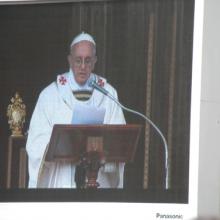military strikes
Two weeks ago, it seemed that any minute the United States would begin bombing Syria. On Aug. 27, NBC’s top headline ran: “Military Strikes on Syria ‘as Early as Thursday,’ U.S. officials say.”
So our Quaker lobby did what all of us peace and security groups do when our country’s decision makers decide to bomb another country and we have long odds and little hope of success from stopping them: we flooded our network — including many of the inboxes of readers of this blog — with pleas to join us in writing, calling, and lobbying members of Congress and the Obama administration to stop this new war.
The pressure worked to postpone U.S. war plans. The groundswell of grassroots opposition to this war persuaded President Obama to go to Congress before launching Tomahawk cruise missiles into Damascus. A vote was expected in days, and then it was delayed, as an unprecedented outpouring of public opposition from Americans of every political stripe pushed Congress to pursue alternatives to military force.
I have been literally disgusted at how “politics” has dominated the media’s response and coverage of the Syria crisis. Millions of lives are at stake, as is the security of one of the most critical regions of the world. But all many of our media pundits can talk about is how this affects politics — i.e., how this could weaken President Obama’s second term or what this might mean for Obamacare.
I heard the same media blathering when I was in London last week when the Syria chemical weapons crisis broke through. “Does the vote in Parliament hurt the Prime Minister and help his opposition?” “Is the Labor Party now up, and the Tory down?”
Who cares?!
I have read countless articles from political, religious, and ethical perspectives on why or why not the U.S. should militarily intervene against the Syrian regime. Most do a decent job evaluating the situation, but I have yet to read one that really puts the human element on the table as a deciding factor.
A few months ago I was going to bed in my hotel room in Tel Aviv when I saw the breaking news alert that there was rocket exchange between Hamas and Israel in and around Gaza. While I have been to many places in "conflict," there is something much different about being somewhere that is only miles away from live fire.
I started playing out the situation in my head: "What if this expands into a major conflict? Can I catch a flight back home to be with my family before it gets worse? I'm only 30-40 miles away from the active conflict, am I already in range sitting in this hotel room?"
Anxiety. Fear. Uncertainty.
Now let me be clear, that experience of anxiety and fear is NOTHING compared to what most Israeli's, Palestinians, Egyptians, or Syrian's have felt in recent years (and MANY other populations). But — even if only in some small way — I could immediately feel the weight of pending war. It is palpable. It is crippling. And if I had my family with me, it would have potentially been unbearable.
Pope Francis on Thursday told world leaders gathered in Russia for the G-20 summit that a military intervention in Syria would be “futile,” urging them to focus instead on dialogue and reconciliation to bring peace to the war-torn country.
The Argentine pontiff’s first major foray onto the global stage comes as the U.S. Congress prepares to vote on a military strike against Syria in response to a reported chemical weapons attack outside Damascus on Aug. 21.
For Francis, just six months on the job, the Syria question will test his ability to summon the power of his global bully pulpit and could play a major role in shaping the global image of a man who’s drawn more attention for his down-to-earth pastoral appeal.



